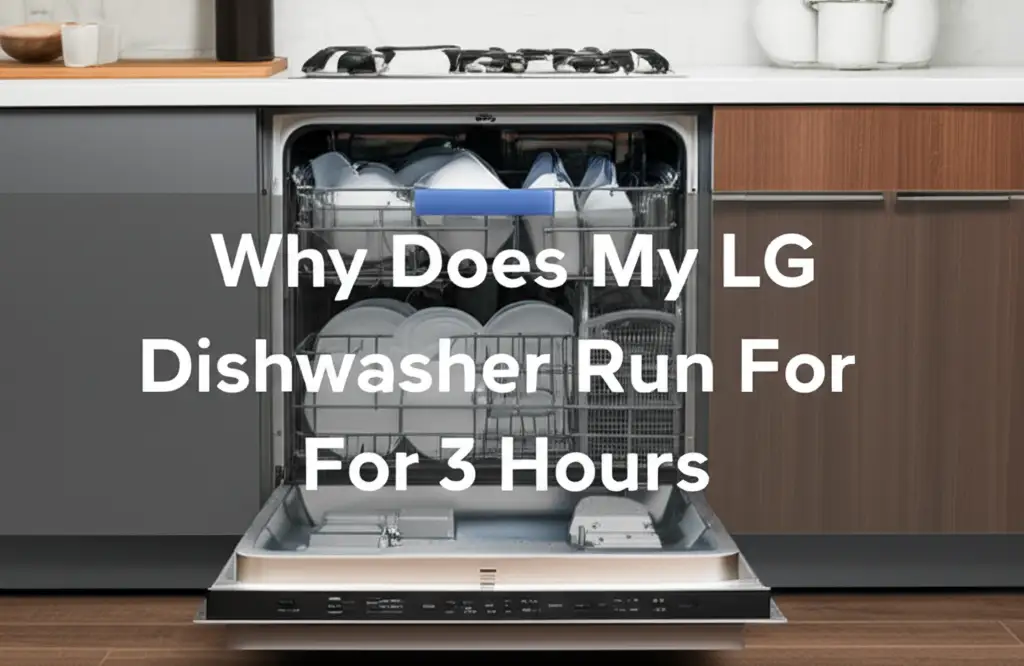· Katria Melrose · LG Appliances · 20 min read
Why Does My Lg Dishwasher Run For 3 Hours

Understanding Why Your LG Dishwasher Runs for 3 Hours
You load your dishes, press start, and expect a clean result within a reasonable time. But then you notice your LG dishwasher running for 3 hours. This extended cycle time can be frustrating. It also raises questions about energy use and the appliance’s health. I know the feeling; a dishwasher that runs too long feels inefficient and wastes your time.
Modern dishwashers use sensors and advanced programs to clean dishes effectively. Sometimes, these features cause longer cycles. However, a cycle lasting three hours might point to an issue. Many factors can contribute to an unexpectedly long wash cycle. These range from simple user errors to component malfunctions. This article explores the common reasons why your LG dishwasher runs for 3 hours. We will also provide clear steps to diagnose and fix these issues. You will learn about typical cycle lengths, sensor problems, water heating, and more. My goal is to help you get your LG dishwasher back to its efficient best.
Takeaway
- Normal Cycles Vary: Modern LG dishwashers often have longer cycles (2-3 hours) due to energy efficiency and sensor-driven cleaning.
- Check Cycle Selection: Ensure you are not using a heavy-duty or sanitize cycle, which naturally extends wash times.
- Verify Water Temperature: Cold incoming water forces the dishwasher to heat it, adding significant time.
- Inspect Filters and Spray Arms: Clogs reduce cleaning effectiveness, making the dishwasher run longer to compensate.
- Examine Sensors: Soil and turbidity sensors can inaccurately detect dirt, causing repeat washes or prolonged cycles.
- Confirm Water Supply and Drain: Low water pressure or drain clogs interfere with proper operation, extending the cycle.
- Load Dishes Correctly: Overloading or poor loading prevents water circulation, leading to inefficient washing and longer cycles.
Why does my LG dishwasher run for 3 hours?
Your LG dishwasher runs for 3 hours because of factors like chosen wash cycle, low water temperature, clogged filters, faulty sensors, or issues with water fill and drain. The dishwasher may extend its cycle to ensure dishes are clean or to compensate for system problems.
Unpacking Typical LG Dishwasher Cycle Times
It is normal for modern dishwashers, including LG models, to have longer cycle times. This is different from older machines. Older dishwashers often finished in an hour or less. Today’s dishwashers are designed for energy and water efficiency. They use less water and heat, but they run longer to achieve the same cleaning power. This often surprises many users.
An average normal cycle on an LG dishwasher can last between 1.5 to 2.5 hours. Heavy-duty cycles or sanitize cycles can easily go beyond this. They might extend to 3 hours or even more. My own LG dishwasher sometimes runs for a lengthy period on its toughest setting. This is by design. Manufacturers use prolonged soaking and gentler washing actions. They do this to save on energy and water. You might think a shorter cycle is better, but these longer cycles are often more efficient overall.
Understanding your specific LG dishwasher model’s cycle times is important. Consult your owner’s manual. It will list the expected duration for each wash program. If your dishwasher consistently exceeds these listed times, then an issue might exist. For example, a “normal” cycle should not take 3 hours. If it does, we need to investigate. This helps distinguish between normal operation and a problem.
Many people wonder why their LG dishwasher takes so long to wash. This is a common question. Often, the reason is simply the cycle chosen. For instance, the “Heavy” cycle or “Sanitize” option will always be longer. These cycles use extra steps like pre-rinses, longer main washes, and high-temperature rinses. They ensure dishes are spotless and germ-free. Always check your cycle selection first before assuming a problem. Understanding these default times is the first step in troubleshooting. You can read more about why your LG dishwasher takes so long to wash if you are curious about general reasons for extended cycles on these appliances. Why Does My LG Dishwasher Take So Long To Wash
The Impact of Water Temperature on LG Dishwasher Cycles
Water temperature plays a crucial role in how long your LG dishwasher runs. Dishwashers rely on hot water for effective cleaning. They also need it for proper drying. If the water entering your dishwasher is not hot enough, the machine will heat it. This process adds significant time to the wash cycle. Most dishwashers need water to be around 120-140°F (49-60°C). If your home’s hot water heater is set too low, or if the hot water has to travel a long distance to the dishwasher, it might arrive cold.
I once found my dishes were not drying well. I learned this was related to insufficient hot water. Dishwashers use the final hot rinse to aid in drying. If the water is not hot enough, dishes do not dry properly. This can also cause the dishwasher to extend its drying phase, adding even more time. You can test your hot water temperature at the kitchen sink. Let the hot water run for a minute. Then, use a thermometer to check its temperature. If it is below 120°F, you might need to adjust your water heater.
Another factor is peak demand for hot water in your home. If someone showers or runs a washing machine while the dishwasher is running, it can divert hot water. This leaves less hot water for the dishwasher. The dishwasher then waits or tries to heat the cold water it receives. This leads to a longer cycle. To avoid this, try running your dishwasher when hot water demand is low. Running your dishwasher at night often helps.
Also, some LG dishwashers have an internal heater. This heater works to boost the water temperature during cycles. If this heater is faulty, the dishwasher will struggle to reach the target temperature. It might continue to run indefinitely trying to heat the water. This can cause the cycle to run for 3 hours or more. If your dishwasher is not drying dishes well, it might be related to this same heating issue. For more information on drying problems, you can refer to an article on why your LG dishwasher does not dry your dishes. Why Does My LG Dishwasher Not Dry My Dishes
Faulty Sensors Causing Extended LG Dishwasher Runs
Modern LG dishwashers are smart machines. They use sensors to detect how dirty your dishes are. These sensors help the dishwasher choose the right cycle length and water usage. The most common sensors are the turbidity sensor and the soil sensor. A turbidity sensor measures how cloudy the water is. A soil sensor detects food particles. If these sensors are faulty or dirty, they can give wrong readings. This often makes your LG dishwasher run for 3 hours or even longer.
Imagine your dishwasher thinks the dishes are still very dirty, even if they are clean. This happens if the soil sensor is coated with grime or food debris. The sensor keeps telling the dishwasher to continue washing. The dishwasher then adds more rinse cycles or extends the main wash phase. I have seen this happen with my own appliances. A simple cleaning of the sensor often fixes the problem. These sensors are usually located near the bottom of the dishwasher tub. You might need to remove the filter to access them.
Another issue can be a malfunctioning turbidity sensor. This sensor checks the clarity of the water. If it constantly reads the water as cloudy, it assumes the dishes are still dirty. This causes the dishwasher to add extra rinse cycles. It keeps trying to clear the water. This adds significant time to the wash program. A faulty sensor might need replacement. Sometimes, just cleaning the area around the sensor helps improve its readings.
A professional can test sensors using diagnostic tools. If your dishwasher’s control panel displays error codes related to sensors, it confirms a sensor issue. Check your owner’s manual for specific error code meanings. Addressing sensor problems is crucial for efficient operation. They often influence the wash duration. If your LG dishwasher runs for 3 hours, a sensor might be the hidden cause.
Clogged Filters and Spray Arms: Common Culprits for Long Cycles
Dirty filters and clogged spray arms are frequent reasons for an LG dishwasher running for 3 hours. These components are vital for cleaning. The filter traps food particles and debris. This prevents them from recirculating onto your dishes. The spray arms distribute water to clean the dishes. If either of these is blocked, the dishwasher cannot clean effectively. It will then try to wash for longer to achieve cleanliness.
The main filter in your LG dishwasher is usually at the bottom of the tub. It consists of a coarse filter and a fine mesh filter. Over time, food scraps, grease, and even hard water minerals can build up. This clogs the filter. When the filter is clogged, water flow is restricted. The dishwasher struggles to remove debris from the wash water. This means dishes do not get properly cleaned. The dishwasher’s sensors may detect dirty water. As a result, the machine extends its cycle, trying to get the dishes clean. I make it a point to clean my dishwasher filter regularly. It is a simple task that prevents many issues.
Spray arms also get clogged. Small food particles or mineral deposits can block the tiny holes in the spray arms. If water cannot spray properly, it cannot reach all dishes. Some dishes remain dirty. The dishwasher, detecting dirty dishes or water, might run longer. It does this to compensate for the poor spray action. You can usually remove the spray arms by unscrewing them or popping them off. Check all the holes for blockages. Use a toothpick or a small wire to clear any debris.
Regular maintenance of these parts is simple. It prevents your LG dishwasher from running for 3 hours unnecessarily. I recommend checking and cleaning the filter at least once a month. This is especially true if you do not pre-rinse your dishes much. Cleaning the spray arms can be done a few times a year. This keeps water flow strong and cleaning efficient. These small steps make a big difference in your dishwasher’s performance and cycle length.
Addressing Drainage and Water Fill Problems in LG Dishwashers
Issues with water filling or draining properly can significantly extend your LG dishwasher’s cycle time. If your LG dishwasher runs for 3 hours, it might be due to it struggling to get enough water or remove it efficiently. Both processes are essential for each wash phase. When they are impaired, the dishwasher attempts to compensate, which prolongs the cycle.
A common problem is insufficient water fill. This can happen due to a kinked inlet hose or a faulty water inlet valve. If the dishwasher does not receive enough water, it cannot complete its wash and rinse cycles effectively. It might pause, waiting for water, or try to fill repeatedly. This adds considerable time to the overall cycle. Low water pressure in your home can also cause this. Always check that the water supply valve to the dishwasher is fully open. I once had a small leak in my water line, which reduced pressure and made my dishwasher run long.
Drainage problems are another frequent cause of extended cycles. If water does not drain completely between wash and rinse cycles, or at the end of the cycle, it can confuse the dishwasher’s sensors. The dishwasher might attempt to drain multiple times. It might also pause the cycle until the water level is acceptable. A clogged drain hose, a blocked air gap, or a malfunctioning drain pump can all prevent proper draining. If you notice water in the bottom of your LG dishwasher after a cycle, this is a clear sign of a drainage issue. This problem can definitely make your LG dishwasher run for 3 hours.
You can often troubleshoot drainage issues yourself. First, check the drain hose for kinks or blockages. Make sure your sink’s garbage disposal is clear if the drain hose connects to it. Running the disposal before starting the dishwasher can help. For more detailed help, you might find an article on why your LG dishwasher has water in the bottom useful. Why Does My LG Dishwasher Have Water in the Bottom If your LG dishwasher is not filling with water, that is a separate but related problem that also extends cycle times. Why Is My LG Dishwasher Not Filling With Water Addressing these water flow issues can often resolve surprisingly long wash cycles.
Load Configuration and Its Effect on Dishwasher Duration
How you load your LG dishwasher has a direct impact on its efficiency and cycle length. Many people do not realize this. An LG dishwasher running for 3 hours might simply be working harder because of how the dishes are arranged. Improper loading prevents water and detergent from reaching all surfaces. This results in dirty dishes, forcing the dishwasher to run longer to try and clean them.
Overloading is a common mistake. Stuffing too many dishes into the dishwasher blocks the spray arms. It also prevents water from circulating freely. The water cannot effectively wash away food particles. Dirty water recirculates, and dishes do not get clean. The dishwasher’s sensors detect this lack of cleanliness. The machine then extends the cycle. It tries repeatedly to achieve the desired level of clean. I used to pack my dishwasher to the brim, thinking I was saving time. I learned quickly that it led to longer cycles and dirtier dishes.
Proper spacing is key. Make sure there is enough room between dishes. This allows water to spray everywhere. Avoid nesting items like bowls or spoons. They can trap water or prevent it from reaching other dishes. Place large items, like baking sheets, on the sides or back. They should not block the detergent dispenser or the spray arms. Always load plates facing the center. Cups and bowls should face downwards to prevent water pooling.
The type of dishes you load also matters. Mixing heavily soiled pots with lightly soiled glasses might cause problems. The dishwasher might choose a tougher cycle. This is because of the dirtiest items. However, the overall load could still be inefficiently washed due to improper placement. This extends the cycle. Taking a few extra minutes to load your dishwasher correctly can save you a lot of time. It ensures an efficient and complete wash cycle. This prevents your LG dishwasher from running for 3 hours unnecessarily.
Hard Water and Detergent Use: Extending Your LG Dishwasher Cycle
Hard water and incorrect detergent use are less obvious culprits for an LG dishwasher running for 3 hours. Many homes have hard water. This means the water contains high levels of minerals like calcium and magnesium. These minerals interfere with detergent effectiveness. They also leave mineral deposits on dishes and inside the dishwasher. This can lead to a longer wash cycle as the machine tries to compensate.
Hard water reduces how well your detergent works. The minerals in hard water react with the cleaning agents in the detergent. This forms a scum that reduces foaming and cleaning power. Dishes may come out with a film or still be dirty. When dishes are not clean, the dishwasher’s soil sensors detect residual grime. This prompts the machine to extend the wash or add extra rinses. This effort to get dishes clean lengthens the cycle considerably. I live in an area with hard water. I have seen how quickly mineral buildup can affect appliances.
Using the wrong amount or type of detergent also causes issues. Too little detergent means dishes do not get clean. This forces the dishwasher to run longer. Too much detergent can create excessive suds. Excessive suds can actually cushion the spray action. They also make it harder for the dishwasher to rinse thoroughly. This can confuse sensors. It makes the dishwasher run extra rinse cycles to clear the suds. Always use detergent specifically for automatic dishwashers. Follow the manufacturer’s recommendations for detergent dosage based on your water hardness and soil level.
Consider using a rinse aid. Rinse aid helps water sheet off dishes. This prevents spotting and promotes better drying. In hard water areas, a rinse aid is almost essential. It helps combat mineral deposits. It ensures dishes come out sparkling. This can prevent the dishwasher from extending cycles due to perceived dirty dishes or poor drying. Using a dishwasher cleaner regularly also helps remove mineral buildup inside the machine. This ensures all components, including sensors and spray arms, work as they should.
When to Suspect a Control Board or Software Issue
If you have checked all the common causes and your LG dishwasher still runs for 3 hours, a control board or software issue might be the problem. This is less common but can certainly cause unexpected behavior. The control board is the “brain” of your dishwasher. It manages all functions, including cycle timing, water fill, heating, and draining. Software glitches can disrupt these operations.
A faulty control board might send incorrect signals. It could tell the dishwasher to add extra steps. It might also cause it to get stuck in a loop. For instance, it might repeatedly try to drain or fill water. This extends the cycle indefinitely. I had a similar issue with an appliance. It just kept running without finishing. This was very frustrating. Sometimes, a power surge or electrical fluctuation can damage the control board. This leads to unpredictable performance.
Software issues are usually less about physical damage. They are more about programming errors. Like any computer, the dishwasher’s software can have bugs. These bugs might cause the cycle to freeze or extend beyond its normal parameters. Sometimes, a simple reset can clear a software glitch. You can reset your LG dishwasher by unplugging it for a few minutes. Then, plug it back in. This often clears minor electronic errors.
If a reset does not work, the control board might need replacement. This is a more complex repair. It often requires a professional technician. Control board failures are not something most homeowners can fix easily. A technician can diagnose the exact problem. They can determine if the board is faulty or if a software update is available. This ensures your dishwasher runs correctly.
Other electronic issues, like a malfunctioning thermostat or a defective heating element relay, can also confuse the control board. These issues might make the dishwasher continue to heat water or run cycles when it should not. This leads to extended run times. These problems often require specific diagnostic tools and parts. This points to the need for professional service.
Energy Consumption of a Long Dishwasher Cycle
When your LG dishwasher runs for 3 hours, it uses more energy than a shorter cycle. This is a practical concern for many homeowners. Modern dishwashers are energy-efficient. However, running for an extended time still adds to your electricity bill. Understanding this helps you see why troubleshooting a long cycle is important.
The main energy consumers in a dishwasher are the heating element and the pump motor. The heating element warms the water. It also helps with drying. The pump motor circulates water and drains it. If your dishwasher is trying to heat water for longer, or if the pump runs more often due to clogs or sensor issues, it draws more power. This increased power draw directly translates to higher electricity costs.
Consider the average kilowatt-hours (kWh) a dishwasher uses. A typical normal cycle might use around 1.0 to 1.5 kWh. If your LG dishwasher runs for 3 hours, especially due to a fault, it could easily double that consumption. For example, if it is constantly reheating water because of a faulty thermostat or cold incoming water, the heating element stays on longer. This consumes a lot of electricity.
I am always mindful of appliance energy use. A dishwasher running too long is a red flag for me. It suggests inefficiency. This is not just about the repair cost. It is about the ongoing operational cost. Solving the problem that causes the long cycle saves you money over time. It also reduces your household’s energy footprint.
To estimate your specific cost, you need to know your electricity rate. You can find this on your utility bill. Multiply the dishwasher’s wattage (or kWh per cycle) by the hours it runs, then by your rate. This gives you a rough idea. For more detailed information on dishwasher energy consumption, you can look up resources on how many kWh it takes to run a dishwasher. How Many kWh to Run Dishwasher Fixing an LG dishwasher running for 3 hours helps save money and energy.
FAQ Section
Q1: Is a 3-hour cycle normal for an LG dishwasher? A1: A 3-hour cycle can be normal for specific heavy-duty or sanitize programs on modern LG dishwashers. These cycles often use less water and energy, but run longer. However, if your standard or normal cycle consistently runs for 3 hours, it usually indicates an issue. Check your owner’s manual for typical cycle durations for your specific model.
Q2: How do I reset my LG dishwasher? A2: To reset your LG dishwasher, first try pressing and holding the “Start/Reset” button for a few seconds. If this does not work, unplug the dishwasher from the electrical outlet for about 5-10 minutes. Then, plug it back in. This hard reset can clear minor electronic glitches and might resolve a prolonged cycle issue.
Q3: Can dirty dishes cause a longer cycle? A3: Yes, very dirty dishes can cause a longer cycle. LG dishwashers have soil sensors. These sensors detect how much grime is present in the wash water. If the sensors constantly detect dirty water, the dishwasher extends the wash time or adds extra rinse cycles. This is an attempt to ensure the dishes become clean.
Q4: How often should I clean my LG dishwasher filter? A4: You should clean your LG dishwasher filter at least once a month, or more often if you use your dishwasher frequently. Filters collect food particles and debris. A clogged filter restricts water flow, reduces cleaning efficiency, and can cause the dishwasher to run longer. Regular cleaning helps maintain optimal performance.
Q5: What is the average lifespan of an LG dishwasher? A5: The average lifespan of an LG dishwasher, like most dishwashers, is typically around 10 to 13 years. With proper maintenance and regular cleaning, some units can last even longer. Factors like usage frequency, water quality, and adherence to maintenance schedules can influence its overall longevity.
Q6: Does overloading my LG dishwasher make it run longer? A6: Yes, overloading your LG dishwasher can make it run longer. Packing too many dishes prevents water and detergent from circulating properly. This means some dishes do not get clean. The dishwasher’s sensors may detect residual dirt, prompting the machine to extend the wash cycle to achieve proper cleanliness. Proper loading ensures efficient washing.
Final Thoughts on Your LG Dishwasher’s Long Cycles
Dealing with an LG dishwasher that runs for 3 hours can certainly be frustrating. I know the feeling of waiting longer than expected for clean dishes. It often indicates a problem that needs your attention. We have covered many common culprits, from simple user errors to more technical malfunctions. Understanding the nuances of modern dishwasher operation is key. It helps you distinguish between a normal, energy-efficient cycle and a genuine issue.
The good news is that many of these issues are fixable with basic troubleshooting and regular maintenance. By checking your water temperature, keeping filters and spray arms clean, and understanding how your dishwasher’s sensors work, you can often restore your appliance to its intended efficiency. Remember to always load your dishwasher correctly. Also, use the right amount and type of detergent. These small habits make a big difference in cycle length and cleaning performance.
If you have tried the basic fixes and your LG dishwasher still runs for 3 hours, it might be time to call a qualified appliance technician. They have the tools and expertise to diagnose complex problems, like faulty control boards or
- LG dishwasher
- dishwasher repair
- long wash cycle





